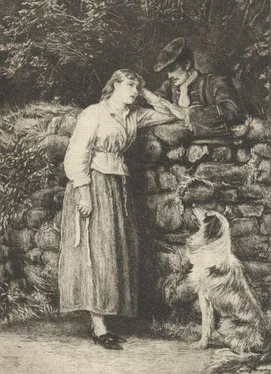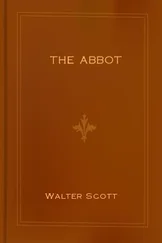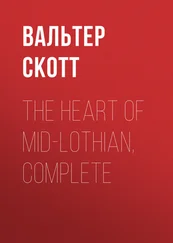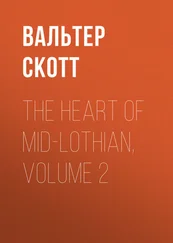Walter Scott - The Heart of Mid-Lothian
Здесь есть возможность читать онлайн «Walter Scott - The Heart of Mid-Lothian» весь текст электронной книги совершенно бесплатно (целиком полную версию без сокращений). В некоторых случаях можно слушать аудио, скачать через торрент в формате fb2 и присутствует краткое содержание. Год выпуска: 2004, Жанр: Исторические приключения, на английском языке. Описание произведения, (предисловие) а так же отзывы посетителей доступны на портале библиотеки ЛибКат.
- Название:The Heart of Mid-Lothian
- Автор:
- Жанр:
- Год:2004
- ISBN:нет данных
- Рейтинг книги:3 / 5. Голосов: 1
-
Избранное:Добавить в избранное
- Отзывы:
-
Ваша оценка:
- 60
- 1
- 2
- 3
- 4
- 5
The Heart of Mid-Lothian: краткое содержание, описание и аннотация
Предлагаем к чтению аннотацию, описание, краткое содержание или предисловие (зависит от того, что написал сам автор книги «The Heart of Mid-Lothian»). Если вы не нашли необходимую информацию о книге — напишите в комментариях, мы постараемся отыскать её.
The Heart of Mid-Lothian — читать онлайн бесплатно полную книгу (весь текст) целиком
Ниже представлен текст книги, разбитый по страницам. Система сохранения места последней прочитанной страницы, позволяет с удобством читать онлайн бесплатно книгу «The Heart of Mid-Lothian», без необходимости каждый раз заново искать на чём Вы остановились. Поставьте закладку, и сможете в любой момент перейти на страницу, на которой закончили чтение.
Интервал:
Закладка:
It may be here noticed, in explanation of another circumstance mentioned in the text, that there is a tradition in Scotland, that George II., whose irascible temper is said sometimes to have hurried him into expressing his displeasure par voie du fait, offered to the Duke of Argyle in angry audience, some menace of this nature, on which he left the presence in high disdain, and with little ceremony. Sir Robert Walpole, having met the Duke as he retired, and learning the cause of his resentment and discomposure, endeavoured to reconcile him to what had happened by saying, "Such was his Majesty's way, and that he often took such liberties with himself without meaning any harm." This did not mend matters in MacCallummore's eyes, who replied, in great disdain, "You will please to remember, Sir Robert, the infinite distance there is betwixt you and me." Another frequent expression of passion on the part of the same monarch, is alluded to in the old Jacobite song—
The fire shall get both hat and wig,
As oft-times they've got a' that.
NOTE P.—Expulsion of the Bishops from the Scottish Convention.
For some time after the Scottish Convention had commenced its sittings, the Scottish prelates retained their seats, and said prayers by rotation to the meeting, until the character of the Convention became, through the secession of Dundee, decidedly Presbyterian. Occasion was then taken on the Bishop of Ross mentioning King James in his prayer, as him for whom they watered their couch with tears. On this the Convention exclaimed, they had no occasion for spiritual Lords, and commanded the Bishops to depart and return no more, Montgomery of Skelmorley breaking at the same time a coarse jest upon the scriptural expression used by the prelate. Davie Deans's oracle, Patrick Walker, gives this account of their dismission.
"When they came out, some of the Convention said they wished the honest lads knew they were put out, for then they would not get away with haill (whole) gowns. All the fourteen gathered together with pale faces, and stood in a cloud in the Parliament Close; James Wilson, Robert Neilson, Francis Hislop, and myself, were standing close by them; Francis Hislop with force thrust Robert Neilson upon them, their heads went hard on one another. But there being so many enemies in the city fretting and gnashing the teeth, waiting for an occasion to raise a mob, when undoubtedly blood would have been shed, and having laid down conclusions amongst ourselves to avoid giving the least occasion to all mobs, kept us from tearing off their gowns.
"Their graceless Graces went quickly off, and there was neither bishop nor curate seen in the street—this was a surprising sudden change not to be forgotten. Some of us would have rejoiced near them in large sums to have seen these Bishops sent legally down the Bow that they might have found the weight of their tails in a tow to dry their tow-soles; that they might know what hanging was, they having been active for themselves and the main instigators to all the mischiefs, cruelties, and bloodshed of that time, wherein the streets of Edinburgh and other places of the land did run with the innocent precious dear blood of the Lord's people."— Life and Death of three famous Worthies (Semple, etc.), by Patrick Walker. Edin. 1727, pp. 72, 73.
NOTE Q.—Half-hanged Maggie Dickson.
[In the Statistical Account of the Parish of Inveresk (vol. xvi. p. 34), Dr. Carlyle says, "No person has been convicted of a capital felony since the year 1728, when the famous Maggy Dickson was condemned and executed for child-murder in the Grassmarket of Edinburgh, and was restored to life in a cart on her way to Musselburgh to be buried . . . . . She kept an ale-house in a neighbouring parish for many years after she came to life again, which was much resorted to from curiosity." After the body was cut down and handed over to her relatives, her revival is attributed to the jolting of the cart, and according to Robert Chambers,—taking a retired road to Musselburgh, "they stopped near Peffer-mill to get a dram; and when they came out from the house to resume their journey, Maggie was sitting up in the cart." Among the poems of Alexander Pennecuick (who died in 1730), is one entitled "The Merry Wives of Musselburgh's Welcome to Meg Dickson;" while another broadside, without any date or author's name, is called "Margaret Dickson's Penitential Confession," containing these lines referring to her conviction:—
"Who found me guilty of that barbarous crime,
And did, by law, end this wretched life of mine;
But God . . . . did me preserve," etc.
In another of these ephemeral productions hawked about the streets, called, "A Ballad by J—n B—s," are the following lines:—
"Please peruse the speech
Of ill-hanged Maggy Dickson.
Ere she was strung, the wicked wife
Was sainted by the Flamen (priest),
But now, since she's retum'd to life,
Some say she's the old samen."
In his reference to Maggie's calling salt after her recovery, the Author would appear to be alluding to another character who went by the name of "saut Maggie, " and is represented in one or more old etchings about 1790.]
NOTE R.—Madge Wildfire.
In taking leave of the poor maniac, the Author may here observe that the first conception of the character, though afterwards greatly altered, was taken from that of a person calling herself, and called by others, Feckless Fannie (weak or feeble Fannie), who always travelled with a small flock of sheep. The following account, furnished by the persevering kindness of Mr. Train, contains, probably, all that can now be known of her history, though many, among whom is the Author, may remember having heard of Feckless Fannie in the days of their youth.
"My leisure hours," says Mr. Train, "for some time past have been mostly spent in searching for particulars relating to the maniac called Feckless Fannie, who travelled over all Scotland and England, between the years 1767 and 1775, and whose history is altogether so like a romance, that I have been at all possible pains to collect every particular that can be found relative to her in Galloway, or in Ayrshire.
"When Feckless Fannie appeared in Ayrshire, for the first time, in the summer of 1769, she attracted much notice, from being attended by twelve or thirteen sheep, who seemed all endued with faculties so much superior to the ordinary race of animals of the same species, as to excite universal astonishment. She had for each a different name, to which it answered when called by its mistress, and would likewise obey in the most surprising manner any command she thought proper to give. When travelling, she always walked in front of her flock, and they followed her closely behind. When she lay down at night in the fields, for she would never enter into a house, they always disputed who should lie next to her, by which means she was kept warm, while she lay in the midst of them; when she attempted to rise from the ground, an old ram, whose name was Charlie, always claimed the sole right of assisting her; pushing any that stood in his way aside, until he arrived right before his mistress; he then bowed his head nearly to the ground that she might lay her hands on his horns, which were very large; he then lifted her gently from the ground by raising his head. If she chanced to leave her flock feeding, as soon as they discovered she was gone, they all began to bleat most piteously, and would continue to do so till she returned; they would then testify their joy by rubbing their sides against her petticoat and frisking about.
"Feckless Fannie was not, like most other demented creatures, fond of fine dress; on her head she wore an old slouched hat, over her shoulders an old plaid, and carried always in her hand a shepherd's crook; with any of these articles she invariably declared she would not part for any consideration whatever. When she was interrogated why she set so much value on things seemingly so insignificant, she would sometimes relate the history of her misfortune, which was briefly as follows:—
Читать дальшеИнтервал:
Закладка:
Похожие книги на «The Heart of Mid-Lothian»
Представляем Вашему вниманию похожие книги на «The Heart of Mid-Lothian» списком для выбора. Мы отобрали схожую по названию и смыслу литературу в надежде предоставить читателям больше вариантов отыскать новые, интересные, ещё непрочитанные произведения.
Обсуждение, отзывы о книге «The Heart of Mid-Lothian» и просто собственные мнения читателей. Оставьте ваши комментарии, напишите, что Вы думаете о произведении, его смысле или главных героях. Укажите что конкретно понравилось, а что нет, и почему Вы так считаете.








